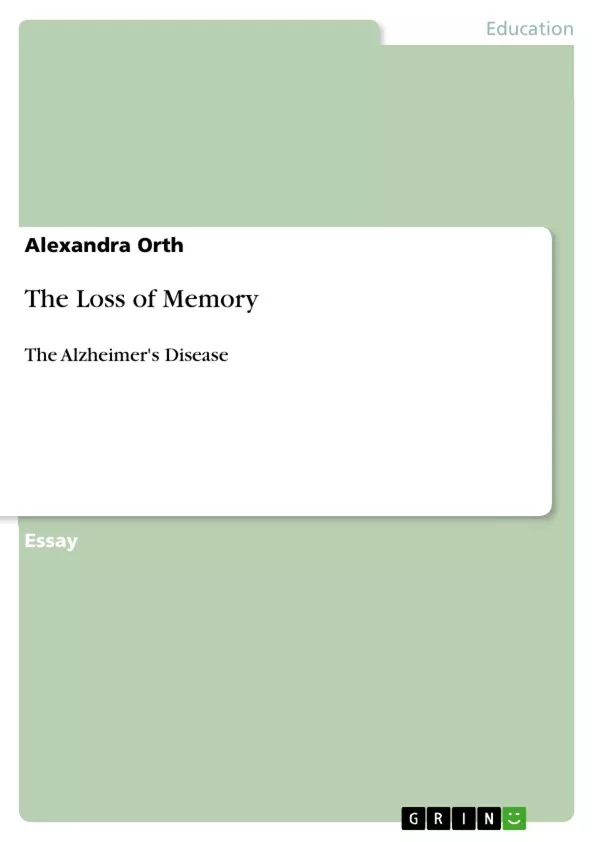1. Essay
The topics memory and recollection occupied philosophers, scientists and historians for centuries, however also in the last years the public found interest in it.
Culture-scientific aspects connected themselves with socio-political developments, this led to a changed understanding to the presence in relation to the past. New achievements and developments within the range of the media and medicine made a renewed reflection inevitable on the question about time and history, about individual and cultural identity.
It did not concern to smolder in memories in order to satisfy the longing of one lost paradise of the absolute knowledge, but rather to see therein a critical argument with history and presence in the view of an open future, cause future needs origin.
Many historical writers and autobiographs have noted public or private events around the time to keep memory, so that future generations have their use from it. However memory and historiography have changed in the course of the time, that he who notes past events has been subject to different attitudes, because social and political conditions change.
An event, which is to remain as recollection in the memory of humans, is firmly connected with the time in that it occurred. However are those, which will write an event down and have written down, in the change of time and the associated change of society and thinking.
This is intended to clarify that memory always lies in the eye of the viewer.
Recollection and memory are nothing else than a product of social groups. Also memories of personal kinds result only from communication and interaction in the framework to such a group. Therefore holding events, in memory or on paper, is always subject to the group, in which each belongs.
Memory stands therefore not only in connection with space and time, but also in the special measure with the identity – „Need for Identity“.
Inhaltsverzeichnis (Table of Contents)
- I. Introduction
- II. List of literature
- 1. Essay
Zielsetzung und Themenschwerpunkte (Objectives and Key Themes)
This essay explores the complex relationship between memory, identity, and cultural understanding. It examines how memory, both individual and collective, is influenced by various factors including social groups, time, and individual perception. The essay aims to demonstrate that memory is not merely a passive repository of the past, but an active and dynamic process of selection, interpretation, and reconstruction.- The role of memory in shaping individual and cultural identity
- The influence of social groups on the formation and interpretation of memories
- The reconstructive and selective nature of memory
- The impact of time and individual perception on memory
- The use of literature and other media as repositories of memory
Zusammenfassung der Kapitel (Chapter Summaries)
The essay begins with an introduction that discusses the significance of memory in contemporary society, highlighting the interplay between cultural, social, and political developments. It further argues that memory plays a crucial role in understanding the past and constructing a vision for the future. The main body of the essay explores various theories on memory, drawing on the works of Jan Assmann, Maurice Halbwachs, and Astrid Erll. These theorists emphasize the social and cultural dimensions of memory, highlighting the ways in which collective memory is shaped by group dynamics and individual experiences. The essay analyzes autobiographical narratives as examples of how individuals engage with and interpret their memories, exploring the potential for distortion and fabrication within the process of remembering. It also examines the role of external factors like documents, photographs, and monuments in shaping individual and collective memory.Schlüsselwörter (Keywords)
This essay revolves around the central themes of memory, identity, and cultural understanding. It examines the concepts of collective memory, reconstructive memory, selective memory, and the influence of social groups on memory formation. Additionally, the essay explores the use of literature, autobiographies, and other media as repositories of memory, highlighting the interplay between individual and collective remembering.Frequently Asked Questions
What is the central theme of "The Loss of Memory" essay?
The essay explores how memory and identity are socially constructed products of communication and interaction within groups.
How does the essay define "collective memory"?
Based on theories by Halbwachs and Assmann, memory is seen as being subject to the social groups to which an individual belongs.
Why does the author state that memory lies in the "eye of the viewer"?
Because social and political conditions change over time, those who record events are influenced by their current societal environment.
What role do autobiographies play in memory research?
They serve as examples of how individuals interpret the past, though they are prone to selection, distortion, and fabrication.
What is the relationship between memory and the future?
The essay argues that "future needs origin," meaning critical engagement with history is necessary to construct an open future.
- Citation du texte
- Alexandra Orth (Auteur), 2006, The Loss of Memory, Munich, GRIN Verlag, https://www.grin.com/document/171582



